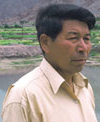 Chewang Norphel
Chewang Norphel
|
Chewang Norphel
Chewang Norphel, 62, of Leh, Ladakh, makes zings
and
artificial glaciers.
Norphel says, "I realised that all the problems in the
region were related to water. In most areas. It was scarce.
In others it was being wasted."
In Ladakh, the annual average rainfall is 50 mm. The only source
of water are glaciers, which melt in summer. This water reaches
the villages late in the season. The locals manage this water
carefully and store it for the year.
Norphel proposes that artificial glaciers be built as a substitute
for dams. He believes that dams are an enormous financial
burden and they bring about environmental and social hazards.
Artificial glaciers are easy to build. First, Norphel channelises
glacier water into a depression lying in the shadow area of
a mountain, hidden from sunlight. He places half-inch-wide
iron pipes at the edge of the depression. As the water keeps
collecting in the pipes, it freezes. As more water seeps in,
it pushes out the frozen blocks, and in turn, itself gets
frozen. This keeps happening in a continuos cycle, and these
frozen blocks create a clean, artificial glacier. Norphel
has made four such glaciers.
In 1996, a year after retirement, Norphel joined the Leh Nutrition
Project, a non-governmental organisation, as project manager
for watershed development.
For details:
Chewang Norphel
Project officer
Leh Nutrition Project
Laddakh-194101
Tel-01982-52151
|
|
|
Moulana
Iftikhar Hussain Ansari
Moulana Iftikhar Hussain Ansari is a politician, a businessman
and now the 'Green Maulvi' of Jammu and Kashmir. As minister
for housing and urban development, he has been credited with
establishing the J&K Lakes and Waterways Development Authority
in 1997 to preserve the Dal lake. Hampered by a massive fund
crunch, there has only been a marginal change in the lake's
condition. But the de-weeding process has been started with
some success. The Moulana firmly believes that he can tide over
the current problem. Once the glory of the Dal is restored,
he plans to start cleaning the Jhelum river. |
|
|






